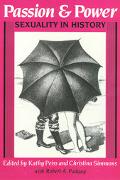

 |

|

The average rating for Passion and Power Sexuality in History based on 2 reviews is 3 stars.
Review # 1 was written on 2017-11-10 00:00:00 Aron Siegel Aron SiegelI had to read several chapters of this for a class when I was an undergraduate in the 1920s. The two most interesting essays for me today were not among these several. One was about sexual assault cases in New York City between 1790 and 1820. In most of the 48 cases that went to trial during these years, both the accuser and the defendant were lower class. Sometimes the accusers were children or teenagers; in these instances, usually the defendant was either a lodger with the accuser's family, or the accuser worked for the defendant. Only in one case was an upper class individual involved, the case of a aristocratic libertine accused of raping a 17-year-old "sewing girl"; he was acquitted at least in part because the accuser had willingly gone walking with him on previous occasions, socializing. Women who fought back against their attackers and had no father or brother to stand up for them in court were exponentially less likely to prevail in their cases than women who didn't resist, and whose male relatives spoke on their behalf. The "assertive woman" was not looked well upon, whether she was assertive in socializing in public (essentially, asking for male attentions), or assertive in defending herself physically or verbally. There was a presumption that the lower class woman or girl, even if barely out of childhood, was an inherently sexual being and a willing participant, or would-be participant, in many or most types of sexual activity (even when the accuser was a virgin). The other article I enjoyed was on mass market romances and their female readership. I could read articles like this forever (although I don't read romances, myself). It would be interesting to read an article like this, examining the tropes of the literature (in the case of Harlequin, specifically required of their manuscripts), every five years, to see how things change. Because of course now this genre has been subdivided into many little niches, each with its rabid fans. This article was from 1979 and at the time, "while the heroine waits for the hero's next move, her time is filled by tourism and by descriptions of consumer items: furniture, clothes, and gourmet foods." Harlequin demands an "emphasis on travel" - unless the story is set in a hospital - "like foreign places, hospitals offer removal from the household, heightened emotional states, and a supply of strangers." The hero is cold, unreadable, hard (his body often granite-like), absent, bored - but in spite of this the heroine always marries him in the end (and in this time period she didn't lose her virginity until marriage). The author argues that Harlequins are pornography in their sexually charged atmospheres and in the way they provide not just escapism, but sexual release, both for heroine and reader. |
Review # 2 was written on 2009-12-02 00:00:00 Robert Hernandez Robert HernandezInteresting, if somewhat dated, overview of the field of sexuality history during the late 1980s. Highly useful if studying for comprehensive exams in history, however! |
CAN'T FIND WHAT YOU'RE LOOKING FOR? CLICK HERE!!!